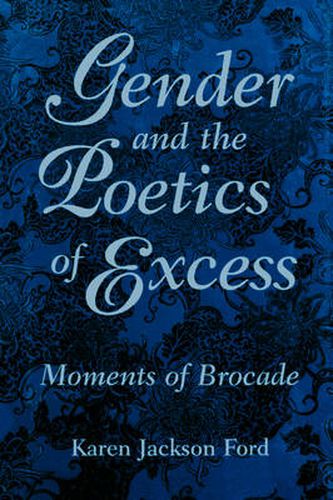Readings Newsletter
Become a Readings Member to make your shopping experience even easier.
Sign in or sign up for free!
You’re not far away from qualifying for FREE standard shipping within Australia
You’ve qualified for FREE standard shipping within Australia
The cart is loading…






This title is printed to order. This book may have been self-published. If so, we cannot guarantee the quality of the content. In the main most books will have gone through the editing process however some may not. We therefore suggest that you be aware of this before ordering this book. If in doubt check either the author or publisher’s details as we are unable to accept any returns unless they are faulty. Please contact us if you have any questions.
The argument posed in this analysis is that the poetic excesses of several major female poets, excesses that have been typically regarded as flaws in their work, are strategies for escaping the inhibiting and sometimes inimical conventions too often imposed on women writers. The forms of excess vary with each poet, but by conceiving of poetic excess in relation to literary decorum, this study establishes a shared motivation for such a strategy. Literary decorum is one instrument a culture employs to constrain its writers. Perhaps it is the most effective because it is the least definable. The excesses discussed here, like the criteria of decorum against which they are perceived, cannot be itemized as an immutable set of traits. Though decorum and excess shift over time and in different cultures, their relationship to one another remains strikingly stable. Thus, nineteenth-century standards for women’s writing and late twentieth-century standards bear almost no relation. Emily Dickinson’s do not anticipate Gertrude Stein’s or Sylvia Plath’s or Jayne Cortez’s or Ntozake Shange’s. Yet the charges of indecorousness leveled at these women poets repeat a fixed set of abstract grievances. Dickinson, Stein, Plath, Cortez, and Shange all engage in a poetics of excess as a means of rejecting the limitations and conventions of female writing that the larger culture imposes on them. In resisting conventions for feminine writing, these poets developed radical new poetries, yet their work was typically criticized or dismissed as excessive. Thus, Dickinson’s form is classified as hysterical and her figures tortured. Stein’s works are called repetitive and nonsensical. Plath’s tone is accused of being at once virulent and confessional, Cortez’s poems violent and vulgar, Shange’s work vengeful and self-righteous. The publishing history of these poets demonstrates both the opposition to such an aesthetic and the necessity for it.
$9.00 standard shipping within Australia
FREE standard shipping within Australia for orders over $100.00
Express & International shipping calculated at checkout
This title is printed to order. This book may have been self-published. If so, we cannot guarantee the quality of the content. In the main most books will have gone through the editing process however some may not. We therefore suggest that you be aware of this before ordering this book. If in doubt check either the author or publisher’s details as we are unable to accept any returns unless they are faulty. Please contact us if you have any questions.
The argument posed in this analysis is that the poetic excesses of several major female poets, excesses that have been typically regarded as flaws in their work, are strategies for escaping the inhibiting and sometimes inimical conventions too often imposed on women writers. The forms of excess vary with each poet, but by conceiving of poetic excess in relation to literary decorum, this study establishes a shared motivation for such a strategy. Literary decorum is one instrument a culture employs to constrain its writers. Perhaps it is the most effective because it is the least definable. The excesses discussed here, like the criteria of decorum against which they are perceived, cannot be itemized as an immutable set of traits. Though decorum and excess shift over time and in different cultures, their relationship to one another remains strikingly stable. Thus, nineteenth-century standards for women’s writing and late twentieth-century standards bear almost no relation. Emily Dickinson’s do not anticipate Gertrude Stein’s or Sylvia Plath’s or Jayne Cortez’s or Ntozake Shange’s. Yet the charges of indecorousness leveled at these women poets repeat a fixed set of abstract grievances. Dickinson, Stein, Plath, Cortez, and Shange all engage in a poetics of excess as a means of rejecting the limitations and conventions of female writing that the larger culture imposes on them. In resisting conventions for feminine writing, these poets developed radical new poetries, yet their work was typically criticized or dismissed as excessive. Thus, Dickinson’s form is classified as hysterical and her figures tortured. Stein’s works are called repetitive and nonsensical. Plath’s tone is accused of being at once virulent and confessional, Cortez’s poems violent and vulgar, Shange’s work vengeful and self-righteous. The publishing history of these poets demonstrates both the opposition to such an aesthetic and the necessity for it.